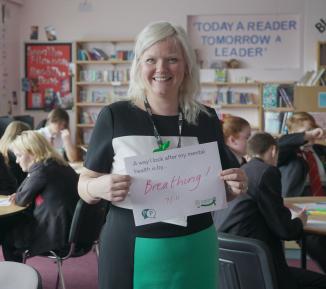Giving young people the skills and knowledge they need to safeguard their mental health and that of their peers.



The Peer Education Project is a secondary school-based educational programme that aims to give young people the skills and knowledge they need to safeguard their mental health and that of their peers.
From my own personal experience working in the programme, it has helped me gain an understanding of everyone’s individual viewpoints, and helped me to explore new perspectives and ideas about mental health.
- Peer Educator
The Mental Health Foundation developed the programme in 2015. From 2015 to 2023, the evaluated programme was delivered to over 40,000 pupils in over 200 secondary schools across the UK and internationally.
The programme resources are now openly available for any school or organisation to use. The following information provides on overview of how you can implement the programme in your school. You will have access to pre-prepared lesson plans, training videos and guidance documents to support you to introduce PEP in your school.
How does PEP work?
You can deliver PEP in your school in 3 simple steps – with ready-to-use resources freely available to download.
Step 1

Step 2

Step 3
Who is involved?
School staff

Peer Educators

Peer Learners

The school has seen significant improvements in behaviour since working with pupils on developing a much greater understanding of their emotions and their mental health.
I would definitely recommend running this project. We need things like this within school to stress how important our mental health is.
It showed the Peer Learners, who were new to secondary school, the importance of talking and removing mental health stigma. Hopefully, in the future, they will know where to go if they need help.
PEP Curriculum
The lessons
Peer Educators will be guided through each lesson, with plenty of options to still put their own stamp on delivery.
The assemblies
Project support
Guidance for staff
Guidance for Peer Educators
Evidence that PEP works
The Peer Education Project has been externally evaluated by the Anna Freud Centre (2016/17) and the University of Bristol (2020/22).
Read the evaluation findings:
Anna Freud Centre
Peer Education Project (PEP) evaluation: final report
Evaluating the Peer Education Project (PEP) in secondary schools
University of Bristol and Lancaster University
Funded by the National Institute for Health Research (NIHR) School for Public Health Research (project number SPHR PHPES025).
- An independent evaluation of the Peer Education Project 2020-22
- The Peer Education Project to improve mental health literacy in secondary schools in England - The Lancet
- Assessing the feasibility of a Peer Education Project to improve mental health literacy in adolescents in the UK - Community Mental Health Journal
- A process evaluation of a peer education project to improve mental health literacy in secondary school students - BMC Public Health
- Exploring mechanisms and contexts in a Peer Education Project to improve mental health literacy in schools in England - Health Education Research
- School-based peer education interventions to improve health - BMC Public Health

It is better for young people to teach younger pupils about mental health. They are close to your age and get what you are feeling.
It was really interesting to learn about how mental health can change someone's life. Even if they look happy on the outside you don't know how they are feeling in the inside.
Every year the Year 12 Peer Educators work hard to deliver the excellent resources provided by the Mental Health Foundation in an understandable and relaxed way to Year 7 students.